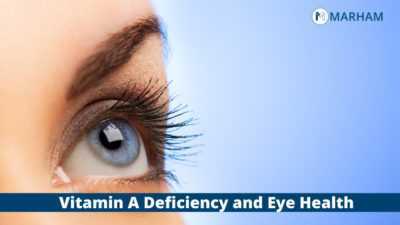Do you know there is a strong connection between vitamin A deficiency and eye health? Issues like eye dryness are one of the vitamin A deficiency symptoms that can even lead to blindness. Vitamin A is a fat-soluble vitamin required for various body processes, including:
- Normal eyesight
- A healthy immune system
- Reproduction
- Healthy skin
What are the causes, and how can you prevent this deficiency? This article contains the information that will help you deal with such an issue. You can also consult an Eye Specialist to get expert advice.
Vitamin A Deficiency


Vitamin A deficiency is a state that appears when you do not take adequate vitamin A in your diet. This may result in various health issues, such as visual difficulties, lowered immunity, and even death. Because the human body cannot make vitamin A by itself, it is necessary to include it in your food through other means.
Minor vitamin A deficiency is curable without causing any permanent complications. A severe deficit is far more prevalent in nations with difficult socioeconomic situations. It is also more common in countries with limited or no access to vitamin A-rich foods than in other countries.
Vitamin A Deficiency Eye Stages


Vitamin A deficiency and eye health issues are of many types, some of which are as follows:
Night Blindness (nyctalopia)
Vitamin A, often known as retinol, is essential for night vision. Vitamin A is responsible for the photosensitive pigments found in the rods (photoreceptors) of the retina. The night vision is due to such rods. To operate appropriately, they must be in the presence of the photosensitive pigment. When there is an inadequate vitamin A, the photosensitive pigments become insufficient. As a result, the rods cannot function properly, resulting in reduced vision at night.
Conjunctival Xerosis
A Vitamin A shortage may prevent the conjunctiva from producing mucus for the lubrication of the eyes, resulting in poor tear quality and dryness on the corneal surface of the eyeball.
Bitot’s Spots
Bitot’s spots are the first signs of vitamin A deficiency and eye health issues. They are characterized as white patches on the conjunctiva with a foamy appearance. These dots usually appear in both eyes at the same time.
Corneal Xerosis
This is a condition known as corneal dryness. The dryness of the cornea leads it to lose its bright, shiny aspect and become murky as a result of the state. Typically, the development of corneal xerosis indicates a significant vitamin A shortage. If you don’t give importance to Vitamin A deficiency at this stage, it will advance to the keratomalacia stage.
Keratomalacia
It is a condition characterized by the cornea’s thinning, softness, and ulceration. It is a severe ocular symptom of vitamin A insufficiency that can be life-threatening. When a primary bacterial infection becomes severe, the cornea may perforate, resulting in blindness.
Corneal Scarring
When corneal ulcers heal, they leave white scars on the cornea’s surface. White spots on the cornea can result in blindness if they develop in both eyes.
Other Vitamin A Deficiency Signs and Symptoms


Besides various eye health issues, vitamin A deficiency also results in other problems. Here is the vitamin A deficiency diseases list.
- Trouble in conceiving and infertility
- Acne and Breakouts
- Throat and chest infection
- Dry skin
- Delayed growth
- Poor wound healing
Vitamin A Deficiency Causes
There are various causes of Vitamin A deficiency and eye health issues, such as:
- Children who consume food of poor nutritional quality are more likely to be vitamin A deficient.
- The risk of Vitamin A deficiency increases in children who are not breastfed. It is also common for kids to be weaned too early from their mothers’ milk.
- If a nursing woman is vitamin A deficient, the infant is more likely to become vitamin A deficient.
Some conditions and disorders can slow down or stop the body’s metabolism of vitamin A. As a result of this, the individual can become vitamin A deficient. They can either block the storage of vitamins or limit their absorption in the blood. They can also induce excessive excretion of vitamins through the urine due to these disorders. Some of the diseases are:
- Cancer
- Celiac disease
- Liver disease
- Pancreatic disease
Prevention of Vitamin A Deficiency
You can avoid vitamin A deficiency and eye health problems by the following methods:
- A regular intake of Vitamin A
- Eating a vitamin A-rich diet that is both healthful and balanced. vitamin
- Breastfeeding in babies
Common Vitamin A sources


- Red bell pepper
- Milk
- Eggs
- Tomatoes
- Pumpkin
- Fish oils
- Beef liver
- Papayas
- Oranges
- Mango
Vitamin A Deficiency Treatment


Besides adding vitamin A-rich food to your diet, the option for vitamin A deficiency treatment is taking vitamin A supplements. But never use this without consulting an expert Nutritionist to avoid any other issue.
Vitamin A deficiency and eye health problems are treatable if you take action on time. Otherwise, it can even cause death. So why not don’t consult a nutritionist now to know if you have vitamin A deficiency or not before it’s too late. You can book an appointment with Best Nutritionist through Marham with just a few clicks. Call Marham helpline: 0311-1222398 or use the online booking facility through the website or Marham mobile app.
| Android | IOS |
|---|---|
  |
  |
FAQs
1. Is blindness caused by a vitamin A deficiency reversible?
Vitamin A supplementation can reverse night blindness. Xerophthalmia, which can vary from curable Bitot’s spots to irreversible blindness, shows a more severe vitamin A deficit. In such cases, doctors suggest other treatment plans.
2. What are some natural ways to receive vitamin A?
You may receive vitamin A by eating plenty of beta-carotene, which the body can convert into retinol. Yellow, red, and green (leafy) vegetables are the primary sources of beta-carotene.
3. What can be the reason for vitamin A deficiency and eye health problems?
Inadequate consumption of vitamin A over an extended period might result in vitamin A insufficiency. This is especially true if you eat a lot of rice (which has no carotene).

